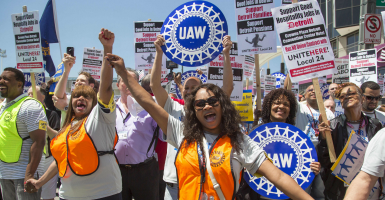MADISON, Wis. — While big labor and the politicians who love their money paint doomsday scenarios should Wisconsin become the nation’s 25th right-to-work state, at least one top national union leader says there is little harm in giving workers the right to choose.
Gary Casteel, secretary-treasurer of the United Auto Workers, said he prefers organizing in a right-to-work environment.
“This is something I’ve never understood, that people think right to work hurts unions,” Casteel said in February, according to a July 1 piece in the Washington Post.
“To me, it helps them. You don’t have to belong if you don’t want to. So if I go to an organizing drive, I can tell these workers, ‘If you don’t like this arrangement, you don’t have to belong,’ versus, ‘If we get 50 percent of you, then all of you have to belong, whether you like to or not.’ I don’t even like the way that sounds, because it’s a voluntary system, and if you don’t think the system’s earning its keep, then you don’t have to pay.”
Right-to-work laws, now in 24 states, including Michigan, Florida and Indiana, prohibit firing workers for choosing not to join a labor union or pay dues.
Casteel’s point, at least at the time, was that unions have and can continue to prove their worth to the worker. Fine, say right-to-work proponents, but let the employee ultimately say.
Public-sector employees have had their say in Wisconsin, where the state’s Act 10 reformed the state’s longstanding and pioneering government collective-bargaining law. Given the choice, public employees in pretty significant numbers have left their unions and their compulsory dues.
The Wisconsin Education Association Council lost more than a third of its membership, declining from about 98,000 to about 60,000 members following implementation of Act 10 in 2011, according to the Wall Street Journal.
American Federation of State, County and Municipal Employees Council 24’s dues-paying membership fell from about 5,900 security and safety employee members pre-Act 10 to 690 in the early months of 2013 — an 88 percent drop.





























